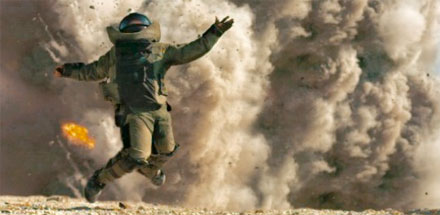
I just saw The Hurt Locker on DVD. Movies about the psychological travails of professional killers are not exactly my cup of tea, but I have to admit that this one richly deserved the Oscars for Film Editing, Sound Mixing and Sound Effects. Its explosions jolted even my supremely blasé Maine Coon out of her slumber and favorite perch. I don’t even begrudge Katherine Bigelow and Mark Boal their Oscars for Best Director and Best Original Screenplay.
Time Magazine doesn’t call this “The Near Perfect War Movie” in vain. War movies are not about war; they are about warriors who are on “our” side. The Hurt Locker is a close study of three members of an Army Explosive Ordnance Disposal (EOD) team in Baghdad circa 2004. Jeremy Renner portrays Sergeant First Class William James, a reckless and nihilistic war addict. James is in a masculine tango with Anthony Mackie, who plays Sergeant J.T. Sanborn, a realistic professional soldier counting the days to the end of his tour. The third member of the dramatic triangle (Owen Eldrige, played by Brian Geraghty) is a Post-Traumatic Stress Disorder (PTSD) case in the making. He talks to the army psychologist and is so terrified as to be barely functional on the field. Owen is the shaky witness of the uneasy brotherhood of his superiors. The texture and dynamics of this triumvirate supports the movie during some of the bizarre action sequences that would otherwise strain credulity.
As a war movie and “a first rate action thriller” (the Wall Street Journal’s description) we should not be surprised that The Hurt Locker depicts bounty hunting Black-Water-type mercenaries as valiant warriors who fight insurgents in tandem with the Hurt Locker trio. It’s the good guys of this movie who refer to anti-insurgency activities as “haji-hunting.” The Hurt Locker does not waste valuable screen time on history or empathy with the locals. Only Camp Gungadins and natives who can be used as Rorschach ink blots to the heroes’ projections get that kind of attention in this kind of movie.
But why get uptight, right? This is a genre flick, after all. And yet, this movie did make me uptight. I could suspend disbelief about the movie’s plot but not about its profound indifference to a nation utterly destroyed in an American preemptive war. Does making this kind of movie say something about those who made it? We know that Mark Boal did the reporting that led to the screenplay as an embedded journalist in an EOD unit in Iraq. We also heard Kathryn Biglow’s Oscar Acceptance speech dedicating the movie thanking the women and men of the military. But the DVD commentary provides more direct evidence for this line of inquiry. There is a scene early in the film in which an American HUMMV is negotiating the traffic in Baghdad. The scene is shot in Jordan. Mark Boal volunteers that the Mayor of Amman was against shutting down the busy street, and it would have been impossible to do without the intervention of the American ambassador. Then comes a scene in which Brian Gheraghty, standing in the HUMMV, throws an empty water bottle at the car blocking it. The man sitting at the back of the car is palpably livid at the garbage-throwing American soldier. We see him through the back window of the car turning around and angrily shaking his arm. The scene cuts to a mangy cat jumping the gutter. And here is the back story to these charming scenes:
Mark Boal: Brian (Specialist Owen Eldrige in the movie) threw a water bottle at some guy in a car. Couldn’t believe he did that. I mean it was a great shot and the guy just didn’t know what the hell was going on. I don’t think that car was working for us, was it?
Kathrine Bigelow: Neither was the cat.
One wonders if the American ambassador had also obtained a license for the crew of The Hurt Locker to abuse the Jordanian “Hajis” and capture their genuine annoyance on film without their consent. One wonders if Hollywood’s newfound conscience about abusing animals in the process of filmmaking also extends to the brown people of the Middle East.
AUTHOR
Ahmad Sadri is Professor Sociology and Anthropology Gorter Chair of Islamic World Studies at Lake Forest College. First published in Huffington Post.






